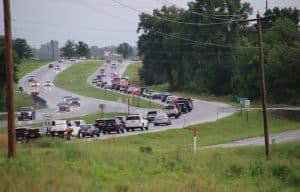Columbia talks projects, funding
The last meeting of the year for the Columbia City Council focused on the future of the city with an emphasis on infrastructure, future projects and a proposed move to “home rule.”
Columbia City Engineer Chris Smith began Monday night’s discussion with an overview of future city roadway, infrastructure and park projects.
Smith’s report included roadway considerations for various intersections and ingress/egress avenues on Route 3 as well as other high-volume traffic areas.
Smith said while there is grant funding the city could pursue related to curb and gutter work and street and sidewalk improvements, there should be a “dedicated source” of income to fund such projects.
Smith said his opinion is the city will “have to have some skin in the game” for moving forward, using a hypothetical future extension from Cherry Street to Columbia Quarry Road or Admiral Trost to Gall Road or Carl Street as examples.
Smith continued by noting grant funds often carry additional requirements which extend the timeframe for completing projects or prohibit the city from applying for them.
He also pointed out the recent expiration of the Admiral Parkway TIF District means tax money which had been used specifically for similar city improvement is no longer an option.
“If you want to maintain the same type of progress, you either have to: A. come up with an alternative revenue source; B. you gotta reallocate funds; or C. you just don’t do as much,” Smith posited.
“It’s not really rocket science,” Smith concluded, adding consideration of such projects in Columbia for the past 20 years has been influenced by the availability of grant funding.
Smith’s report dovetailed into a continued discussion of “home rule” led by Columbia City Administrator Doug Brimm.
Becoming a home rule municipality would provide Columbia “the greatest level of local control available to municipalities,” according to Brimm.
Governments in home rule municipalities have an increased ability in issuing and allocating use of local taxes. Otherwise, municipalities are beholden to procedures and policies implemented at the state level.
“The primary objective of the city council in pursuing home rule is to maintain status quo – if not continue to lower – the city’s property tax rate,” Brimm continued.
He outlined three ways in which home rule would benefit Columbia. First of all, the move could improve the city’s bond rating which would allow the city to save money through reduced interest payments.
Furthermore, Columbia would be able to incur debt past a 20-year window, thereby lowering the annual burden on taxpayers.
Lastly, Brimm suggested home rule authority would allow Columbia to shift city operating costs to non-residents through imposition of a home rule sales tax, food and beverage tax or hotel and motel tax rate increase.
“A majority of new revenues will be coming in from outside of the city and outside of residents’ checkbooks,” Brimm speculated, pointing to a compilation of data from December 2021 through November 2022 showing a large percentage of restaurant and business patronage coming from non-residents of Columbia.
Referring to Smith’s report, Brimm said $9.7 million has been spent on recent infrastructure improvements with about 56 percent – about $5.5 million – coming from grant funding.
However, with grant funding becoming more competitive, Brimm said there is “no guarantee that these alternative funding mechanisms of this nature will be available,” even though Smith has already secured about half of the $5.5 million in current known project funding through grants.
Brimm clarified that the home rule efforts will help in other areas besides infrastructure, including needed improvements to the city’s sewer treatment plant and public safety complex.
Per state mandate, Columbia’s sewer treatment plant needs to be replaced by 2035, at a “ballpark cost” of $25 million. A new public safety complex would run between $15-20 million, Brimm said.
The “sheer magnitude” of those projects and uncertainty regarding the city’s potable water provider past 2028 present “significant management challenges.”
If Columbia adopted home rule, it would allow funding to come from sources “not solely derived from residents and property owners,” Brimm argued.
While home rule authority is not without controversy, Brimm said a public information campaign, including a series of town hall presentations, would be held if the council chose to present the home rule question to Columbia residents during an upcoming election.
He also noted while home rule puts more power in the hands of elected officials, the democratic process is similarly strengthened as voters have more impact on the city’s direction through aldermanic and mayoral elections.
Aldermen have until the Jan. 16 city council meeting to approve adding a home rule referendum question to the April 2023 ballot.
In other business, the council approved an ordinance which will allow dogs on the walking trails at Bolm-Schuhkraft Park.
A motion was also passed which awards a bid for a Valmeyer Road reconstruction project to DMS Contracting, Inc., in the amount of $901,752.
The council also approved two resolutions regarding Columbia Department Public Works employees.
The first resolution provides a scale of reimbursement based on length of subsequent employment for new DOPW employees, who are now mandated by the state to obtain a commercial driver’s licence.
The second resolution establishes percentages of employee and city contributions for DOPW employees’ insurance contributions.






